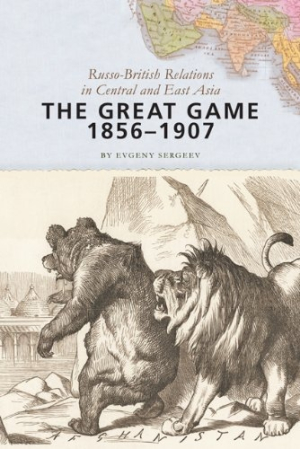
The Great Game, 1856-1907
Russo-British Relations in Central and East Asia
Extensively researched and enriched text details British imperialism in India.
“The Great Game” of this book’s title was the half century of political maneuvering and machinations in the Hindu Kush and in India’s Northwest Frontier region; during this time, Great Britain guarded approaches to India, the jewel of the British Empire, while Russia sought to expand its presence in Central Asia. An empire-building Russia was deemed a threat to British imperial interests. As Lord Curzon famously said, with possession of India, Britain was an imperial power; without India, Britain would be a third-rate nation. The perceived stakes were high, and advancing in or even “winning” the Great Game occupied desk-bound policy-makers, in-the-field diplomats, senior military officials, and numerous young adventure seekers. Late in the day, it came to occupy Rudyard Kipling; every British schoolboy will remember his ever-engaging Kim.
Before Sergeev undertook this magisterial account, two highly readable books had appeared on the Great Game, those of Peter Hopkirk, and Meyer and Brysac. While both works are well researched, feature colorful elements, and recount much high adventure, Sergeev, a professor at the Russian Academy’s Institute of World History, has undertaken a rigorously analytical approach enriched by extensive citations from primary sources in British, Indian, Russian, Georgian, Uzbek, and Turkmen archives. As a result, he is able to move beyond the Game to its players, to the architects of strategy. The reader is at the table with senior policy-makers, listening to them balance possibilities and practicalities within the strictures of shifting relations between Russia and Britain.
Both sides courted potential allies, but with no guarantee of securing support. The forward-frontier zealot Lord Curzon, Viceroy of India, “not only moved the pieces in the Great Game on the traditional squares of Persia and Afghanistan, but also, for the first time, brought Tibet within its scope.” But, as were so many other moves, the imperious Curzon’s was thwarted. He had to state, “We seem to be moving in a vicious circle. If we apply to Tibet, we either receive no reply or are referred to the Chinese resident. If we apply to the latter, he excuses his failure by his inability to put any pressure on Tibet.”
Always fueling British outreach was the belief that India was threatened; in presenting Russian agendas, Sergeev provides new insight and valuable correctives to this belief. A huge and highly interesting cast crosses his stage—and many players can be followed up through his extensive notes and bibliography.
Reviewed by
Peter Skinner
Disclosure: This article is not an endorsement, but a review. The publisher of this book provided free copies of the book to have their book reviewed by a professional reviewer. No fee was paid by the publisher for this review. Foreword Reviews only recommends books that we love. Foreword Magazine, Inc. is disclosing this in accordance with the Federal Trade Commission’s 16 CFR, Part 255.
